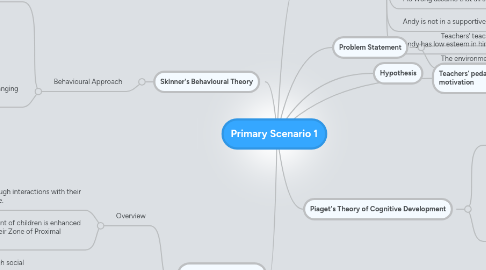
1. Vygotsky's Theory of Cognitive Development
1.1. Overview
1.1.1. Children learn through interactions with their surrounding culture.
1.1.2. Cognitive development of children is enhanced when they work in their Zone of Proximal Development (ZPD)
1.2. Teachers' Pedagogical Skills
1.2.1. Knowledge is passed on through social interactions
1.2.2. Teachers to collaborate with students to facilitate learning.
1.2.3. Teacher to plan activities where children can work together
1.2.4. Teacher to limit lecturing and explaining as much as possible
2. Skinner's Behavioural Theory
2.1. Behavioural Approach
2.1.1. Imparting information
2.1.1.1. Making contracts with students
2.1.2. Methods of controlling and changing the students' behaviour
2.1.2.1. Punishment and extinction
2.1.2.1.1. Punishment is the consequence invloving undesired behaviour
2.1.2.1.2. Extinction is the removing of a stimulus that cause the behaviour
2.1.2.2. Making contracts with students
2.1.2.2.1. Child and teachers agreeing on what behaviour is required and what will happen if the agreed contract is not met and the rewards the students will receive for fufilling the contract
2.1.2.3. Positive & negative reinforcements
2.1.2.3.1. Praising a student
2.1.2.3.2. Giving rewards
2.1.2.3.3. Removing an activity a student doesn't like
3. Teachers’ pedagogical approaches influence students ‘ intrinsic motivation
4. Problem Analysis
4.1. Ms Wong has low expectations on Andy
4.2. Ms Wong did not help Andy even though she knows that Andy is weak in his studies
4.2.1. New node
4.3. Ms Wong is ineffective in teaching
4.4. Ms Wong allow negative peer pressure to exist in class
4.4.1. New node
4.5. Ms Wong assume that all students have the same learning ability
4.6. Andy is not in a supportive social environment
4.7. Andy has low esteem in himself
5. Problem Statement
5.1. Teachers’ teaching style adversely affect the weaker students more
5.2. The environment will affect the students’ learning
6. Hypothesis
7. Piaget's Theory of Cognitive Development
7.1. Concrete Operational Stage (7-11 Years Old)
7.1.1. Ability to consider factors simultaneously
7.1.2. Able to solve complex problems
7.2. Teachers' Pedagogical Skills
7.2.1. Use concrete props and visual aids
7.2.2. Give students opportunity to manipulate and test objects
7.2.3. Presentations and readings to be brief and well organised
7.2.4. Use familiar examples to explain complex ideas
7.2.5. Present problems that require logical, analytical thinking
